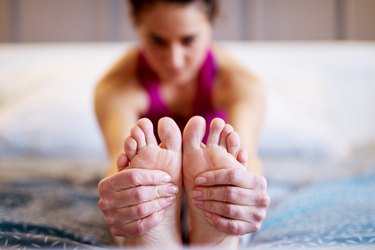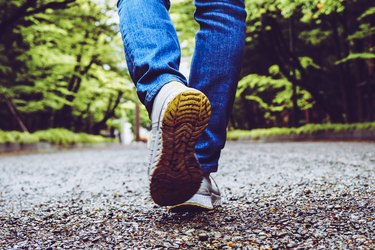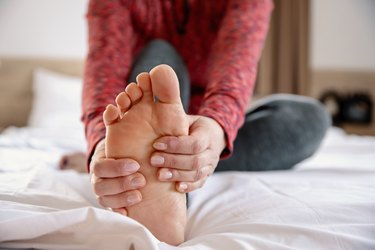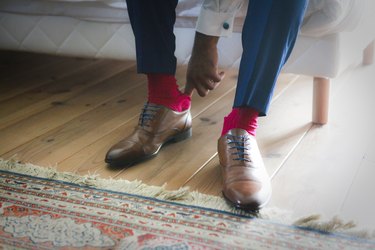
You've always worn the same shoe size since, well, forever. Then one day you wake up and your tennis shoes feel a tad tight, or your sandals are suddenly a little snug.
No, you're not imagining it. "Everybody's feet get bigger as we get older," says board-certified podiatrist and foot and ankle surgeon, Mark J. Mendeszoon, DPM.
Video of the Day
Video of the Day
"Typically, as we enter our fourth decade, it's not unusual for our feet to grow by one full size," Dr. Mendeszoon says.
OK, but why does age affect our foot size so much?
Here, Dr. Mendeszoon helps us get to the bottom of this freaky foot phenomenon and explains what you can do about it (spoiler alert: you can't shrink your dogs to their previous size, but you can prioritize foot health to prevent any serious age-related foot problems).
4 Reasons Your Feet Grow With Age
1. Overuse
"In one day, a person can put several million pounds of pressure on their feet," Dr. Mendeszoon says. That's because "the average person places four times their body weight with every step and takes between 5,000 to 10,000 steps a day," he says.
Over time, this adds up to a lot of strain and wear-and-tear on your tootsies.
"The feet should work like a shock spring suspension — like in your automobile — but as we get older, our feet will start to weaken and break down," Dr. Mendeszoon says.
Indeed, the supportive structures that assist your foot's arch (like ligaments and tendons) will become worn, according to the Cleveland Clinic.
The repeated strain on these tissues not only shifts the shape of your feet but can also cause you to develop chronic overuse conditions, Dr. Mendeszoon says.
Some common overuse issues include, per Dr. Mendeszoon:
- Tendonitis
- Plantar fasciitis
- Hammertoes
- Bunions
- Nerve problems
2. Weight Gain
Due to a variety of factors — such as a more sedentary lifestyle, a slower metabolism, etc. — it's common to pack on a few pounds in older age. But this weight gain is almost guaranteed to affect your feet.
"As we get heavier, there's more stress applied to the feet," which will start to collapse under the weight, Dr. Mendeszoon says. Literally. Our arches will begin to flatten, and the ligaments and tendons that support our feet will stretch out, he says. These changes can lead to the lengthening and widening of your feet.
What's more, weight gain can also modify the mechanics of your gait, placing even more stress, force and pressure on your feet, according to the Cleveland Clinic. And this can result in their reshaping.
To make matters worse, while you may weigh more in your senior years, the fatty cushion that pads the bottom of your feet will become flimsier and provide less shock absorption, per the Cleveland Clinic. That's because your body stores fat differently as you age.
But your feet growing or shifting shape isn't just an inconvenience — it can also trigger a damaging domino effect that produces more serious problems.
For example, your muscles may try to compensate for these changes in your feet by working overtime. This often results in muscle imbalances, and if left unchecked, can eventually contribute to discomfort, pain and overuse injuries, Dr. Mendeszoon says.
3. Hormonal Changes
In your lifetime, your feet can take a hit thanks to periods of fluctuating hormones.
Pregnancy is a prime example. Indeed, when you're expecting, you can also expect the size and width of your feet to change, Dr. Mendeszoon says.
Here's why: During pregnancy, your body produces a hormone called relaxin, fittingly named because it relaxes and enhances your ligaments' elasticity, according to the Cleveland Clinic. While relaxin's main purpose is to prepare your pelvis and cervix for birth, its relaxing effects can impact many other body parts, including your feet.
And as the ligaments in your feet relax, your arches tend to droop and flatten, causing your tootsies to grow longer and wider, per the Cleveland Clinic.
Similarly, oxytocin — a hormone that's produced to allow the baby's passage through the birth canal — can also weaken the ligaments throughout your body and flatten out your feet, Dr. Mendeszoon says.
Adding insult to injury, other factors common in pregnancy — including increased weight gain and foot swelling — can also loosen the ligaments and lead to bigger, wider feet, he adds.
Yet another time of tumultuous hormonal change happens during menopause, which can also meddle with your feet. That's because a drop in estrogen, along with other hormonal fluctuations, can decrease bone density.
But a lower bone density may increase your odds of developing osteoporosis and stress fractures in your feet, which can shift bones out of place and change the shape of your feet, according to Harvard Health Publishing.
4. Underlying Medical Conditions
As we age, we're more likely to be dealing with a health issue. And certain medical conditions can impact our pedes.
For instance, rheumatoid arthritis can affect your foot's size and shape, Dr. Mendeszoon says. Rheumatoid arthritis is a chronic inflammatory disorder that damages the lining of your joints, producing swelling, bone erosion and joint deformity, according to the Mayo Clinic. In fact, this painful condition typically affects smaller joints first, like those found in your feet.
Another medical issue that can spell trouble for your tootsies is a nerve condition called neuropathy, Dr. Mendeszoon says. Neuropathy happens when your peripheral nerves are damaged and can cause weakness, numbness and pain, frequently in the hands and feet, per the Mayo Clinic.
People who have neuropathy may lose sensation in their feet, and if they develop subtle injuries, they may not even feel pain or discomfort in the area, Dr. Mendeszoon says. Problem is, if a person continues walking with a foot injury, over time, the joints can become increasingly stressed and weakened. This can cause bony prominences or bone deformities to develop, leaving the feet to become flattened, wider and less functional, he says.
How to Care for Your Feet
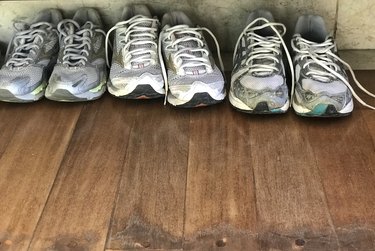
While larger feet are likely inevitable as we grow older, we can take precautions to prevent more serious foot problems that are not a natural part of the aging process.
1. Stretch Often
When it comes to current and future foot health, fostering your feet's flexibility is a smart idea. And stretching is a simple way to do that.
Achilles stretching is especially important, Dr. Mendeszoon says. He recommends the following Achilles stretches to build better flexibility in your feet and lower limbs:
Stair Stretch
- Stand with the balls of your feet on the edge of a step, holding onto a railing for balance.
- While keeping one leg stationary, drop the other heel down below the step, feeling a stretch in the Achilles.
- Hold for about 15 seconds, repeating 10 times on each leg.
Wall Stretch
- Place your hands against a wall.
- Step one foot back, keeping the leg straight, and press your heel into the ground.
- Gently push your hips forward, feeling the stretch in your calf.
- Hold for at least 15 to 30 seconds, then switch legs.
2. Maintain a Healthy Weight
To minimize foot problems, deformities and age-related changes in our feet, maintaining a healthy weight for your body can be beneficial, Dr. Mendeszoon says.
Eating a nutrient-dense diet, exercising regularly and staying hydrated can all help with this goal, he says.
3. Wear Proper Fitting Shoes
Over decades, poor shoe choices (read: cramming your foot into uncomfortable high heels or frequently wearing flip-flops) can sabotage your foot heath.
Think of it like this: Ill-fitting shoes offer no support, cause foot fatigue and weaken your feet, Dr. Mendeszoon says. And all of these things can distort the shape of your dogs.
Luckily, there's an easy way to combat this — simply sport shoes that fit your feet correctly. To ensure a fantastic fit, Dr. Mendeszoon recommends going to a shoe store to have your feet properly measured.
4. Switch Out Old Sneakers
You might have an old pair of running shoes that feel as comfy as slippers. But odds are these worn-in sneakers are wearing out your feet.
"Most walking or running shoes only last for approximately 500 to 600 miles of wear," Dr. Mendeszoon says. Once you pile on more miles than that, the shoe supplies less support. That means more strain on your feet.
"On average, your shoes should be changed at least every six to 12 months depending on how many miles are covered," he says.
When to See a Doctor
Though it's common for our feet to grow larger as we grow older, foot pain is not a normal consequence of aging.
"If regular stretching, wearing proper shoes or utilizing over-the-counter inserts do not help with chronic foot pain, it's imperative that a person sees a foot and ankle specialist such as a podiatrist," Dr. Mendeszoon says.
A foot expert can appropriately assess, diagnose and treat your condition and hopefully help reduce further foot-related pain.
Even if you're not experiencing any discomfort, visiting your doctor for an annual foot check is a smart strategy to stay ahead of more serious medical issues. As a matter of fact, a foot exam can help identify disorders like diabetes or circulatory conditions (which can manifest as foot problems), according to the Cleveland Clinic.
Was this article helpful?
150 Characters Max
0/150
Thank you for sharing!
Thank you for your feedback!
Is this an emergency? If you are experiencing serious medical symptoms, please see the National Library of Medicine’s list of signs you need emergency medical attention or call 911.
